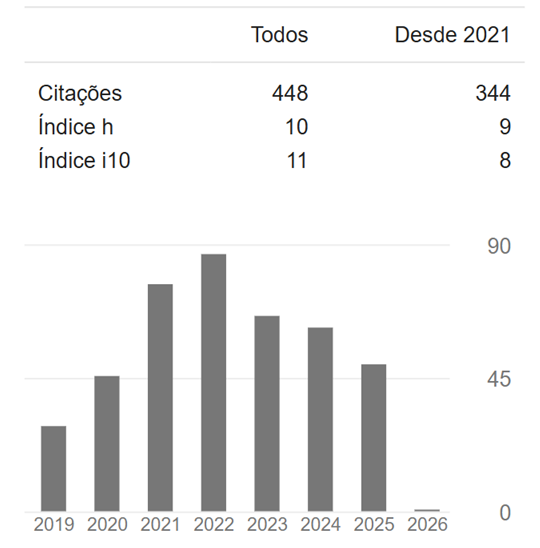Ethno-cultural development of children of preschool age in the process of connection to decorative-applied art
Palavras-chave:
Ethno-culture, Ethno-cultural, folk culture, arts and crafts, ethno-cultural skillResumo
The article updates and substantiates the role of ethno-cultural education of Russian children of senior preschool age in the process of acquaintance with arts and crafts. The theoretical and methodological foundations of the ethno-cultural education of children of the senior preschool age are studied in the process of acquaintance with arts and crafts, the ethno-cultural education of preschool children as a social and psychological and pedagogical phenomenon is described, the state of program and methodical support for the realization of ethno-cultural education of preschool children in modern conditions of development of preschool education is analyzed, the role of arts and crafts in ethno-cultural education of children of senior preschool age in Russia is defined. The article suggests a set of measures, including a special program "We are wizards", aimed at the ethno-cultural education of senior preschoolers, which can be recommended to the mass practice of teachers of pre-school general educational institutions and teachers of additional education for children.
Downloads
Referências
AFANASYEVA, A.B. Ethno-cultural education in Russia: theory, history, conceptual basis: monograph / A.B. Afanasyev. - St. Petersburg: Publishing House "University Educational District of St. Petersburg and the Leningrad Region", 2009. – 296 p.
BABUNOVA, E.S., GRADUSOVA, L.V., LEVSHINA, N.I., MICHURINA, YU.A., STEPANOVA, NA, TURCHENKO V.I., CHERNOBROVKIN, V.A., SHEPILOVA, N.A. Teoretiko-applied bases of socially-communicative development of preschool children. - Magnitogorsk, 2015. – 329s.
CHELYABINSK. Our home is the Southern Urals: a program-methodical complex for organizations implementing educational programs for preschool education. Chelyabinsk: Chelyabinsk Regional Department of the Russian Children's Fund, 2014. – 253p.
CHERNOBROVKIN, V.A. Artistic and aesthetic development in the system of preschool education // International Scientific and Research Journal - N. 9 (51) 2016 Part 4, p. 103-105. - Access mode. - URL: http://research-journal.org/wp-content/uploads/2016/09/9-4-51.pdf
POGODINA, S.V. Theory and methods of development of children's fine arts: Textbook. allowance for stud. establishments of environments. prof. Education / S.V., Pogodin. -3 th ed., Sr. - Moscow: Publishing Center "Academy", 2012 -352p.
SOLOMENNIKOVA. M .Programs of preschool educational institutions: methodical recommendations for employees of pre-school educational institutions / comp. OA: Arcti, 2000. 112 p.
STEPANOVA, N.A., SANNIKOVA, L.N., LEVSHINA, N.I., YUREVICH, S.N., CHERNOBROVKIN, V.A. Parental evaluation of preschool education quality: is it a problem or an opportunity? Man in India. 2017. T.97. № 5. p. 171-185.
ZAKHAROVA, L.M. Ethno-cultural education of children of preschool age in domestic pedagogy [Electronic resource] - URL: http://elar.urfu.ru/bitstream/10995/18926/1/iurp-2010-85%282%29-05.pdf (circulation date 28.06 .2018).
ZENKOVA, L.G. Ethno-cultural environment as a psychological and pedagogical condition for the ethno-cultural education of preschool children in the children's art school / LG. Zenkova // Bulletin of Tomsk Pedagogical University. - 2012. - n. 4. - p. 195-197.
Downloads
Publicado
Métricas
Visualizações do artigo: 41 PDF downloads: 64
Como Citar
Edição
Seção
Licença
Copyright (c) 2019 Revista Tecnia

Este trabalho está licenciado sob uma licença Creative Commons Attribution 4.0 International License.
Autores e autoras que publicam na Tecnia concordam com os seguintes termos:
1) Autores e autoras mantêm os direitos autorais e concedem à revista o direito de primeira publicação, com o trabalho simultaneamente licenciado sob a Licença Creative Commons Attribution, que permite o compartilhamento do trabalho com reconhecimento da autoria e publicação inicial nesta revista.
2) Autores e autoras têm autorização para assumir contratos adicionais separadamente, para distribuição não exclusiva da versão do trabalho publicada nesta revista (ex.: publicar em repositório institucional ou como capítulo de livro), com reconhecimento de autoria e publicação inicial nesta revista.
3) Autores e autoras têm permissão e são estimulados a publicar e distribuir seu trabalho online (ex.: em repositórios institucionais ou na sua página pessoal) após a finalização do processo editorial, já que isso pode aumentar o impacto e a citação do trabalho publicado (Veja O Efeito do Acesso Livre).








